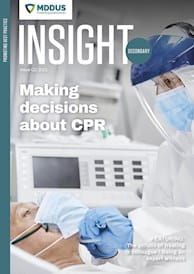BACKGROUND
Mr A has been diagnosed with prostate cancer and is advised that the gland needs to be removed. The 56-year-old is referred to a private surgeon, Ms H, who discusses the surgery with him, including potential risks.
Ms H carries out a laparoscopic radical prostatectomy, which appears to proceed without incident. However, three days later Mr A complains of a burning pain in his abdomen. A scan reveals a perforation in his bowel which requires emergency surgery, including a loop colostomy.
Over the following weeks, Mr A requires a number of further procedures and admissions to hospital to resolve intra-abdominal infection and for reconstruction. He eventually makes a full recovery and his colostomy is reversed.
Three months later, Ms H receives a letter from solicitors representing Mr A alleging negligence in the way she carried out the surgery and for failing to recognise the rectal injury at the time of the surgery. If Ms H hadn’t caused the rectal injury, the letter adds, the patient would not have suffered the complications he did.
ANALYSIS/OUTCOME
Ms H contacts MDDUS for assistance and provides an account of the surgery. She confirms that she had detailed pre-operative discussions with Mr A about the potential complications of a prostatectomy, including the risk of rectal injury.
She says she took all reasonable steps to check for rectal injury before completing the surgery, and believes it may have developed post-operatively. Ms H is unsure how it could have happened, but admits it may be connected to her use of thermal energy (TE) to elevate the seminal vesicles.
She adds that she has apologised to the patient for the complications he has suffered and an internal review of the incident was carried out.
An expert report commissioned by Mr A’s solicitors makes reference to the use of TE as a likely cause of the rectal injury. Use of TE, the expert opines, is not safe practice due to the unpredictable way in which the heat can spread.
MDDUS commissions its own expert to review the evidence and she is generally supportive of the care Ms H provided. She disputes the assertion that TE is wholly unsafe and says it could be argued that minimal use of TE is supported by a responsible body of urological surgeons.
However, she does acknowledge the lack of formal guidance or consensus relating to the use of TE and notes that standard teaching recommends against using the technique on seminal vesicles. To cause a rectal injury, the expert says, the vesicles must have been too close to the rectum while TE was applied.
For these reasons, the MDDUS expert states that it would be difficult to argue that Ms H did not breach her duty of care. An MDDUS adviser discusses the issue further with Ms H and the surgeon agrees it would be best to settle the claim without admission of liability.
Ms H is grateful that experts on both sides acknowledged how her clinical notes show that she diagnosed and treated the patient’s rectal injury quickly and that her post-operative care was of a very high standard.
KEY POINTS
- Ensure you remain up to date with the latest guidance and best practice, even for procedures you carry out frequently.
- Where no formal guidance exists in relation to a specific procedure/technique, proceed with caution.
- Comprehensive clinical notes can be invaluable in defending a claim of negligence.
This page was correct at the time of publication. Any guidance is intended as general guidance for members only. If you are a member and need specific advice relating to your own circumstances, please contact one of our advisers.
Read more from this issue of Insight Secondary

Save this article
Save this article to a list of favourite articles which members can access in their account.
Save to library


